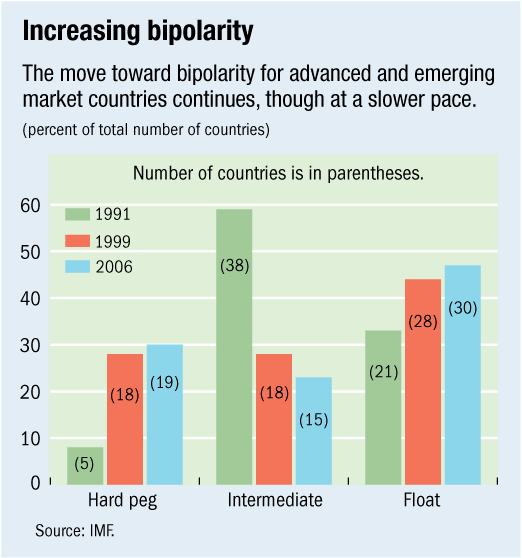2007 IMF Research Conference

Typical street scene in Santa Ana, El Salvador. (Photo: iStock)
IMF Survey: Exchange Rate Regime Bipolarity Continues, Slowly
November 27, 2007
The economic crises of the 1990s forced many countries to reexamine their choice of exchange rate regimes and to move away from more crisis-prone arrangements.

Stanley Fischer: Advanced and emerging market countries have continued to shift to hard pegs or free floating regimes (photo: IMF)
This resulted in a shift from soft pegs—the use of pegged but adjustable rates—toward either a hard peg or a free floating regime.
In his popular 2001 essay on "Exchange Rate Regimes: Is the Bipolar View Correct?" Stanley Fischer, then First Deputy Managing Director of the IMF and now Governor of the Bank of Israel, had predicted that the move toward bipolarity by many advanced and emerging market countries, which was strikingly visible in the 1990s, was likely to continue. Soft pegs had proven to be unviable over time, Fischer had said in 2001, for countries with open capital accounts. Various currency crises dating as far back as the 1970s had shown that countries could not simultaneously maintain fixed exchange rates, capital mobility, and domestically oriented monetary policies—the so-called "impossible trinity."
Revisiting bipolarity
Delivering this year's Mundell-Fleming Lecture—"Exchange Rate Systems, Surveillance, and Advice"—at the IMF's eighth Jacques Polak Annual Research Conference on November 15, Fischer revisited the topic of bipolarity and updated it in the light of the experience of the last decade. The shift by advanced and emerging market countries from the more crisis-prone soft pegs, in which the government commits itself to defending a particular exchange rate value or narrow range of values, toward hard pegs or floating regimes, Fischer found, had continued over time, though at a reduced pace (see chart). This trend had though reversed among other (mostly developing) countries, which had seen a move away from the floating rate to the intermediate regimes.

But why has the pace slowed of the bipolar shift in advanced and emerging market countries? The introduction of the euro and the 1990s' emerging market financial crises were largely responsible for the faster pace of the shift, he said. The current decade has not seen any events on a similar scale, though the slowly growing number of Europe's Economic and Monetary Union countries means the shift to bipolarity for the advanced and emerging market country grouping is likely to continue, he explained.
Two qualifications
Although the recent exchange rate regime developments in developed and emerging market countries had been broadly consistent with the bipolar view, Fischer emphasized two important qualifications to the hypothesis. First, the shift to bipolarity applies to countries with open capital accounts, he said, though some countries in the emerging market grouping (in the chart) had significant capital controls.
This qualification was noted in Fischer's 2001 bipolar hypothesis: "for countries open to international capital flows: (i) soft exchange rate pegs are not sustainable; but (ii) a wide variety of flexible exchange rate regimes remain possible; and (iii) it is to be expected that policy in most countries will not be indifferent to exchange rate movements. ... For countries not yet open to international capital flows, [possible exchange rate regimes] include the full gamut of exchange rate arrangments." But perhaps the original qualification "was not adequately stressed," Fischer said.
Second, the floating group consists of not only free floaters but also managed floats. In fact, for the emerging market and the "other" categories in Fischer's sample, there are more "managed" than "independent" floaters. Even among "independent" emerging market floaters, there are many countries that intervene signficantly and often, a fact that shows that "very few countries, if any, are indifferent to the behavior of the exchange rate," he remarked.
Surveillance worries
In his comments on IMF surveillance and advice, Fischer noted that the IMF's 2007 Bilateral Surveillance Decision "puts exchange rate policies at the center of the surveillance process." But he voiced concern that the new decision's focus on exchange rate policies—rather than on domestic and exchange rate policies or "overall policies"—was a drawback, as the focus on exchange rates alone was "too narrow." He hoped that the new decision would not reduce the scope of small economies' Article IV staff reports, which he characterized as "the most thorough and professional evaluation of a country's economy and economic policies."







